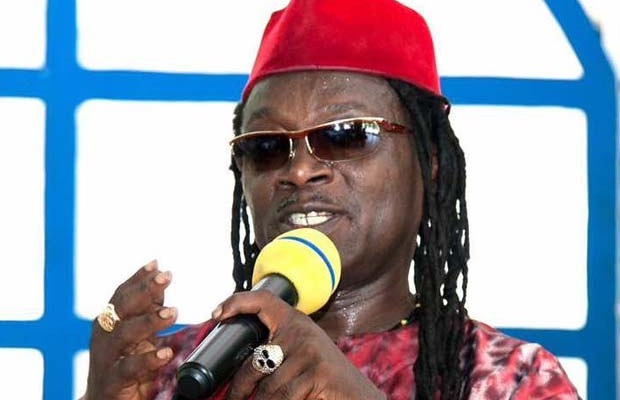Veteran highlife musician Amandzeba has spoken about the seeming nonchalance of Ghanaians in helping promote and preserve Ghana's highlife music genre.
He told Kwame Dadzie on Joy FM's Showbiz A-Z that although highlife is rich in Ghanaian culture and has the potential to represent the country globally, Ghanaians seem to have failed in projecting it.
He made this comment while discussing UNESCO’s move in to list highlife as intangible cultural heritage.
“Collectively, we seem to have failed. We normally trivialize our heritage, everything. The Chinese can make our kente, they can do anything at all with our own heritage and then we sit in silence and keep admiring them while we know that we have the thing and must be developed here.
It’s just like music. When we had highlife, right from the outset, it affected everybody along the coast even all the way to Zaire, Congo and other places. Take the likes of Fela Kuti, Miriam Makeba, Hugh Masekela. They were here [because of highlife]," he said.
He also recounted that a lot of music stars across the world keep asking what Ghanaians are doing to project the highlife genre.
According to Amandzeba, while National Folkore Board is working at making UNESCO list highlife as intangible cultural heritage is commendable, the media must also take the responsibility to make sure the genre lives on.
A few weeks ago, Ama Serwah Nerquaye-Tetteh, the Secretary General of the Ghana Commission for UNESCO, mentioned that highlife will be listed by UNESCO as Ghana’s intangible heritage soon.
This comes after series of engagements and conferences organised by the Ghana Folklore Board and the Ghana Cultural Forum to discuss plans by which Ghana’s highlife can be listed as a UNESCO’s list of Intangible Cultural Heritage (ICH).
An intangible cultural heritage (ICH) is a practice, representation, expression, knowledge, or skill considered by UNESCO to be part of a place’s cultural heritage.
Intangible heritage consists of non-physical intellectual wealth, such as folklore, customs, beliefs, traditions, knowledge, and language.
Intangible cultural heritage is considered by member states of UNESCO in relation to the tangible World Heritage, focusing on intangible aspects of culture.
Jamaica’s reggae and Congo’s rhumba are some music genres listed by UNESCO as intangible heritage.
Latest Stories
-
NPP Abanga breaks ranks to shield NDC twin brother in ‘galamsey’ accusations
2 hours -
Saminu Abdul Rasheed smashes national record again with 9.84s sprint in Georgia
3 hours -
Blekusu Coastal project: We’re reclaiming our coastlines – Housing Minister
5 hours -
Pricey plantains push Ghana’s market sellers to diversify
6 hours -
Full list: NPP delegates approve 54 reform motions, reject proposals on youth age, election supervision
6 hours -
WAFCON 2024: Cynthia made it easy – Chantelle hails goalkeeper after penalty saves
6 hours -
Cyber Security Authority boss suspended over use of military bodyguard
6 hours -
WAFCON 2024: I want to make history – Grace Asantewaa dreams of lifting the trophy
6 hours -
Afenyo-Markin accuses NDC of rebranding and claiming credit for NPP projects
7 hours -
2024 WAFCON: Grace Asantewa shines as Black Queens reach semis
7 hours -
WAFCON 2024: Ghana beat Algeria 4-2 on penalties to book semi-final spot for the first time since 2016
7 hours -
NPP Delegates reject motion to shift polling station selection oversight to regional committees
7 hours -
2024 WAFCON: Black Queens set up semifinal clash with hosts Morocco
7 hours -
Dr. Amuasi champions healthy sustainable socio-ecological systems thinking in Lancet One Health Commission Report
7 hours -
Without unity, we’re just individuals with ambition – Afenyo-Markin
7 hours

